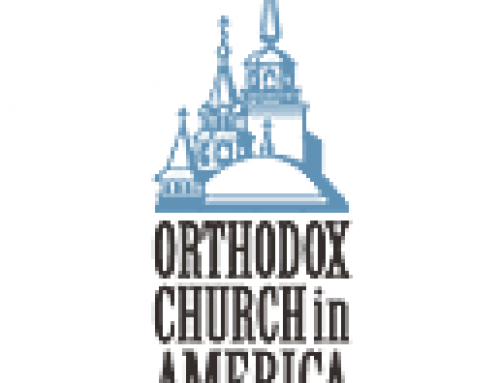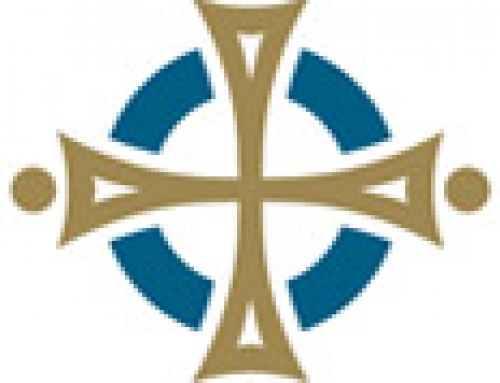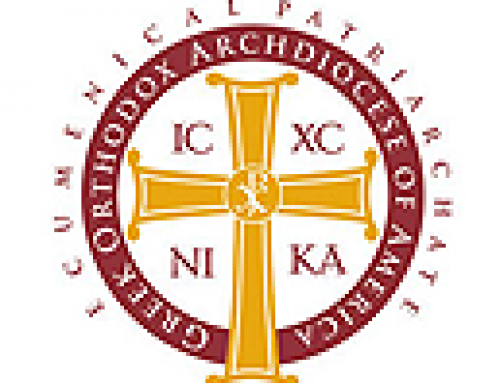This post was originally published on this site
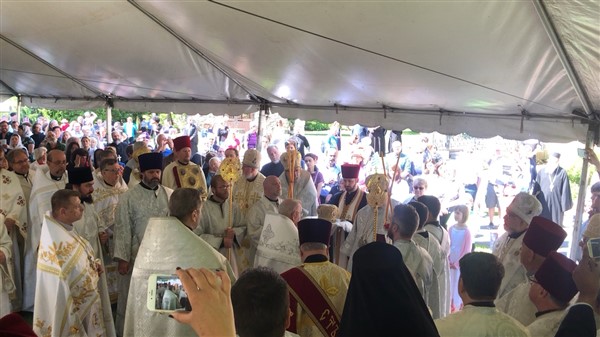
The 115th annual Memorial Day Pilgrimage to Saint Tikhon’s Monastery opened on Friday afternoon, May 24, 2019 as His Beatitude, Metropolitan Tikhon welcomed the Hawaiian Myrrh Streaming Icon of the Iveron Mother of God at the monastery’s iconic entrance arch. A Molieben in honor of the icon was celebrated in the Monastery Church of Saint Tikhon of Zadonsk, followed by the celebration of Vespers and Matins. During the dinner that followed, Hieromonk Herman [Majkrzak] delivered the opening lecture, titled “Christ, the Fountain of our Life,” which helped to set the spiritual tone for the weekend.
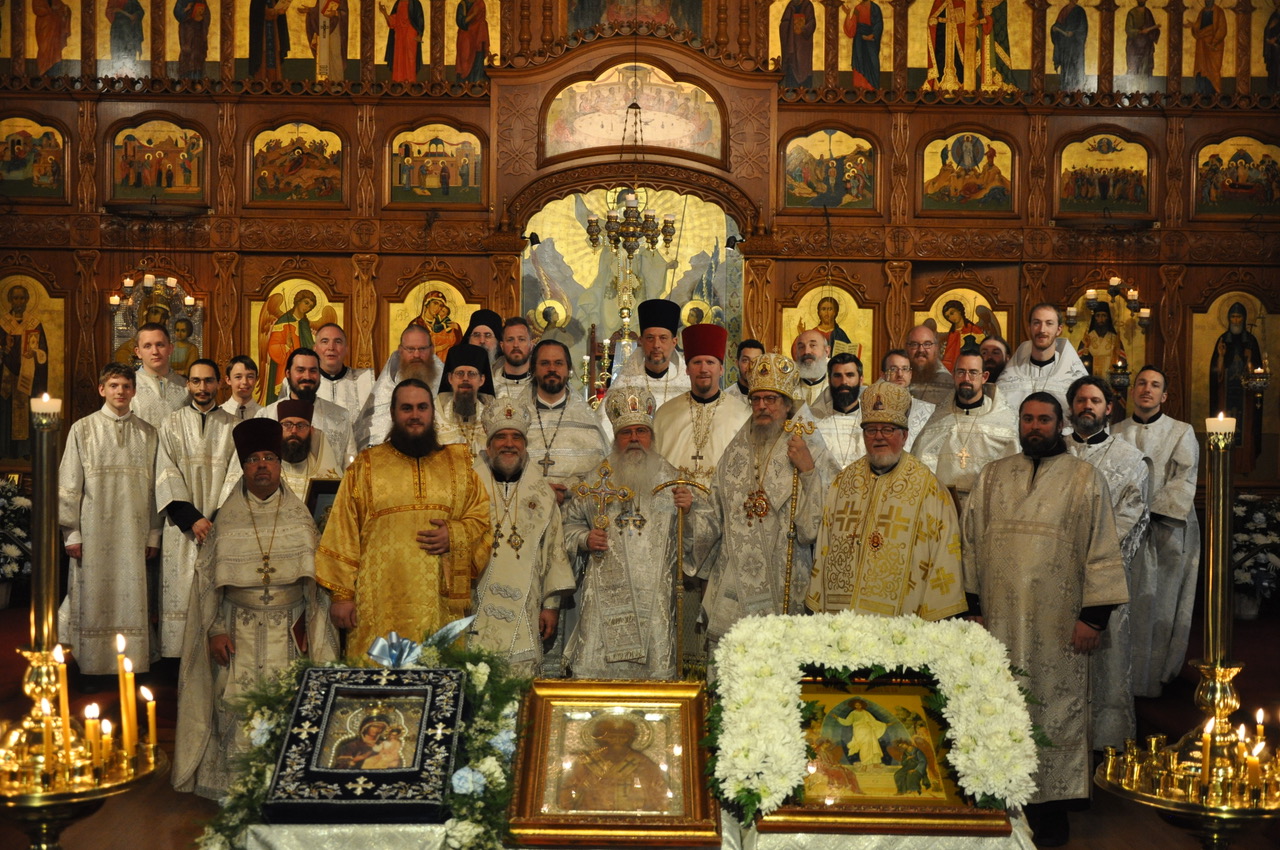
On Saturday, May 25, Metropolitan Tikhon concelebrated the Hierarchical Divine Liturgy in the monastery church with His Eminence, Archbishop Melchisedek; His Eminence, Archbishop Michael; and His Eminence, Archbishop David. During the Divine Liturgy, Subdeacon John Parker, a third-year student of Saint Tikhon’s Orthodox Theological Seminary [STOTS], was ordained to the diaconate, while third-year seminarian George Davis was tonsured to the order of Reader. In the afternoon, degrees and certificates were conferred on the 15 members of the seminary’s Class of 2019. The day closed with the celebration of Vespers and Matins in the monastery church.
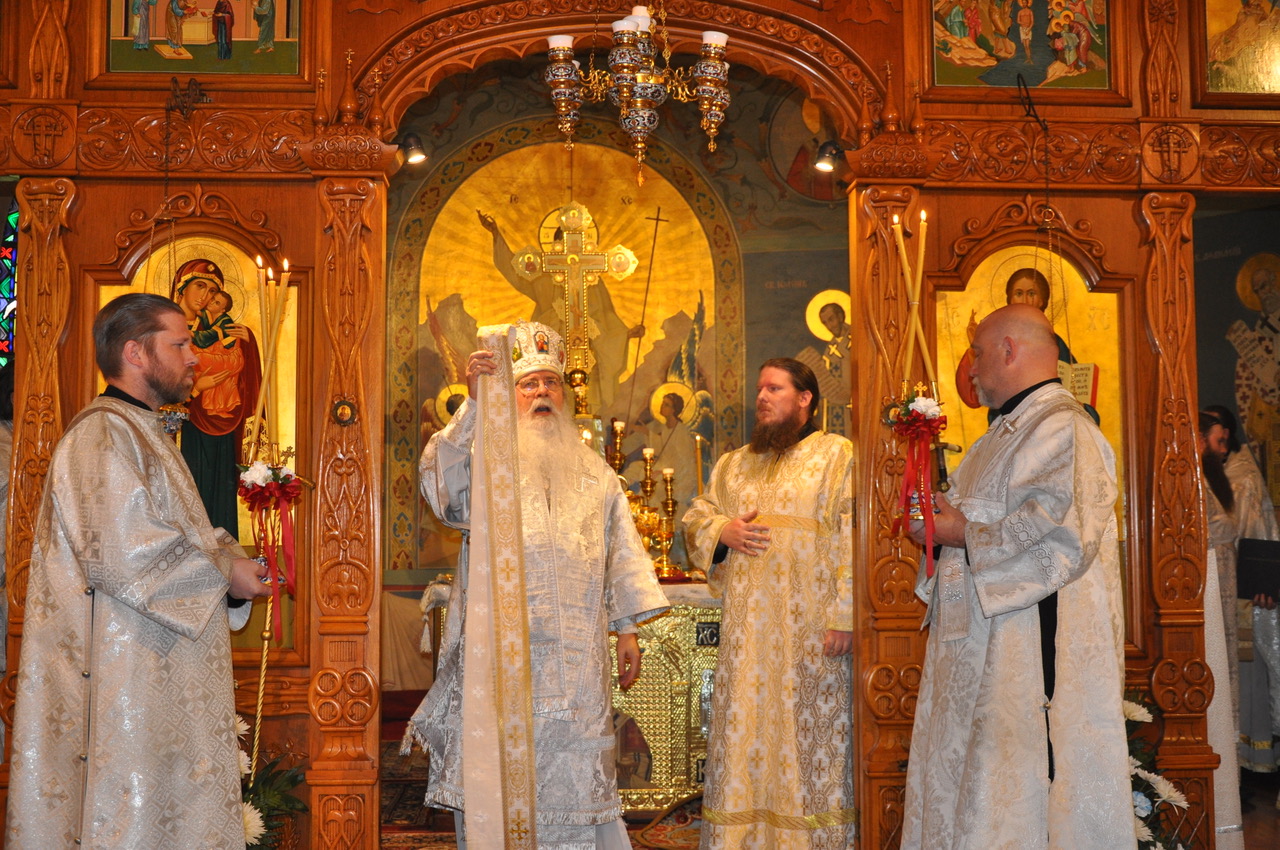
The Hierarchical Divine Liturgy was celebrated in the monastery church on Sunday, May 26. During the Divine Liturgy, Subdeacon Herman Garrison, a second-year student of STOTS, was ordained to the diaconate. In the evening, the world premiere of Benedict Sheehan’s “Liturgy of Saint John Chrysostom (2018)” was presented at Saint Stephen’s Pro-Cathedral, Wilkes-Barre, PA. The concert was preceded by a discussion led by Mr. Sheehan, Director of Music and STOTS Assistant Professor of Liturgical Music, and Dr. Peter Jermihov, Artistic Director of the PaTRAM Institute Singers. Mr. Sheehan directed the concert choir, composed of members of the Saint Tikhon Choir and the PaTRAM Institute Singers. His setting of the Divine Liturgy is among the first to be composed for the English language, with the sumptuous a cappella score drawing on the rich tradition of Russian Orthodox choral music with echoes of the diverse array of musical traditions that make up the Church in America today. The annual Memorial Day weekend concert is widely recognized as a highlight of the artistic season in the Northeast Pennsylvania region.
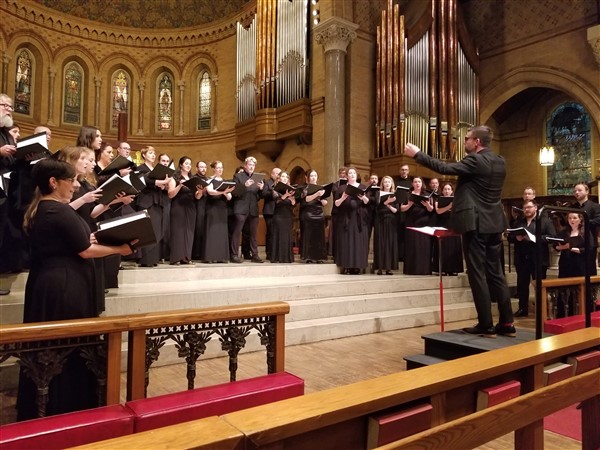
On Monday, May 27—Memorial Day—Metropolitan Tikhon concelebrated the Divine Liturgy at All Saints of North America Bell Tower with Archbishop Melchisedek, Archbishop Michael, Archbishop David, Archimandrite Sergius, and numerous priests and deacons. During the Divine Liturgy, Archpriest Eugene Pianovich was awarded the miter in recognition of his decades of faithful ministry to the Orthodox Church in America. The text of Metropolitan Tikhon’s stirring homily may be found below.
Memorial day afternoon as filled with a number services and activities, including an Akathistos in honor of Saint Alexis Toth of Wilkes-Barre, whose relics are enshrined in the monastery church; a Panikhida for departed veterans; and a Molieben in honor of the Mother of God with the anointing of the sick, infirm and all pilgrims. Children enjoyed a number of activities as pilgrims enjoyed browsing a number of vendors offering liturgical goods, books, artisan crafts and a variety of food.
The pilgrimage officially closed with the celebration of Vespers and Matins in the monastery church. A photo gallery can be viewed on the OCA website and Facebook page.
Homily of His Beatitude, Metropolitan Tikhon
Saint Tikhon’s Monastery
115th Memorial Day Pilgrimage Divine Liturgy
Monday, May 27, 2019
In the Name of the Father, and of the Son and of the Holy Spirit.
My Dear Brothers and Sisters in Christ:
Glory to God that we have been granted the blessing to assemble once again in the joy of the Resurrection of our Lord, God and Savior, Jesus Christ, and to do so here, on the grounds of the oldest Orthodox Monastery in North America, as we celebrate this Divine Liturgy, which marks the culmination of the 115th Annual Memorial Day Pilgrimage. We are blessed to be here with so many hierarchs, clergy and faithful to receive the hospitality of the Monastery Brotherhood, to be strengthened by the presence of the Myrrh-streaming Iveron Icon of the Mother of God, and to marvel at the glad tidings of the Resurrection.
Is this not why come in pilgrimage? To marvel at the glad tidings of the Resurrection, to find renewal, regeneration and new life, to ponder the remarkable words of the Lord, Who has just told us “if anyone keeps My word he shall never see death.”
“If anyone keeps my word he shall never see death.”
Is this not why we come in pilgrimage? To hear these word and to receive them as encouragement and strengthening for our own lives, which are filled with joy and sorrow, with temptation and with relief from temptation, with anxiety and peace? Is it not these words which provide the balance to the ups and downs of our journey on the sea of life?
“If anyone keeps my word he shall never see death.”
Today, we have heard in particular of the adventures of the Apostle Peter from the Acts of the Apostles. It is a small snapshot of his apostolic mission, as we hear him coming to the door of the house of Mary, the mother of John, and knocking at the gate. Rhoda, the young woman who recognizes his voice, runs back with joy to tell the others, who themselves do not believe her, because they know that Peter has been in prison. Taken out of context, this is a strange and incomplete story, but taken within the entirety of the Apostle Peter’s ministry and life, it is a confirmation of the Lord’s promise that those who keep His word will never see death.
The Apostle is in prison precisely because he was preaching the resurrection, the Word of life, as the Lord commanded the Apostles to “preach to the people, and to testify that it it Christ who was ordained by God to be Judge of the living and the dead” (Acts 10:42). Peter was sent to share the living experience of the Resurrection to which he and the other Apostles were witnesses and for which they now had become ambassadors.
The Apostles were ambassadors for the word of truth given to them, offered to all of mankind, by our Lord Jesus Christ. But the Lord also reminds us that we must be of a certain disposition to hear and receive that truth: “Jesus said to them, ‘If God were your Father, you would love Me, for I proceeded forth and came from God; nor have I come of Myself, but He sent Me. Why do you not understand My speech? Because you are not able to listen to My word.”
It is the Word of God, and our listening to it, which gives us hope in the midst of our turbulent lives. It was not easy even for the Apostles. It was precisely for his hearing of this word, and his preaching of that word, not as an intellectual proposition, but as an experienced truth that Peter was put in prison. And he went through quite an adventure even to get to that point: seeing a vision in which God reminded him that nothing created by God is unclean and that he was being called to preach to the gentiles, being arrested and thrown in prison, being released miraculously from prison by an angel, returning to the disciples but being left outside knocking on the door, and from there continuing on his apostolic journey to the ends of the earth—and ultimately to his martyrdom. But Peter did all of these things because he was convinced in the depths of his being that Jesus was the Christ, the Son of the Living God.
Our lives may not be as dramatic as the Apostle’s, but in many ways, his life mirrors our own life, which is also filled with ups and downs, good days and bad days, successes and tragedies, joys and sorrows. His life is also an instruction for us to remain grounded in Christ, and to remember that it is His “sayings that course with life”, and His “commandments which are a light unto our feet” because they point us to the One Who is our rock, to the One Who is our firm foundation in the midst of the turmoil of life.
If we look beyond our own personal and family lives, we find ourselves in the swirl of a global environment that is full of anger, war, conflict and persecution. We are buffeted back and forth between extremist groups of every conceivable agenda who will not rest until their position has the dominance, even at the cost of human lives. Even in our own country, as we commemorate today the brave souls of our military servicemen and women, those who died in defense of the democratic values of freedom, honesty and honor, we are confused by the political extremism of our own competing political parties, where no one seems to be offering the truth of Christ, the unity of Christ, or the peace of Christ.
Recently, an Athonite Abbot shared these words: “There are those among us who are referred to as progressives, who are eager for dialogue. And those who are regarded as conservatives, who generally reject contact with others. This is where the authenticity of our faith is decided: because we do not preserve the truth by cursing those who are in error, nor do we offer what the human soul is looking for through acts of phony compliments. Here we have need of the true heroes of the faith, who save their souls by losing them for the Lord’s sake.”
The Church of Christ offers us the possibility of being freed from prison, like the Apostle Peter was freed from prison. But the prison we are freed from is not a physical prison, but rather the prison of our own opinion. To be freed from this prison is to seek the “boldness of faith and the truth of love which liberates us.”
How do we attain this boldness of faith and truth of love which liberates man?
The task of the Church, and our task as Christians, is to make manifest the will of God and to solve our problems, to address the fear that hovers over us, with the life of Christ that is within us. We do this, as the same Athonite Abbot reminds us, being conscious of the fact that “the Church is the God-man Himself. This is the fact that keep us alive. So the question is not how to provide solutions to our problems; it is a matter of letting it become apparent how our problems are solved by the Lord Who lives in us. When that happens, then peace and calm reign among all.”
A handful of monastics arrived from Valaam Monastery to the shores of Alaska and planted the seeds of the Church in North America 225 years ago. What distinguished this ragged band of monks and preachers was not simply their external accomplishments, their solving of practical problems, of their missionary activity. What distinguishes them, and that for which we remember them today, is the fact that they were not trapped in the prison of their own reasoning, but rather have found the freedom that comes from Christ, that is, that they kept the word of Christ and never saw death. It is from their hearts, purified through asceticism and strengthened in love, that these early missionaries accomplished all that they accomplished.
Next year, the Orthodox Church in America will celebrate the 50th Anniversary of the Glorification of the chief of that ragged band of monastics, the Venerable Herman of Alaska. We will also celebrate the 50th anniversary of the Granting of Autocephaly, which was not a political or even ecclesiastical accomplishment for the Church in North America. Rather, it was the crowing of over two centuries of faithfulness to the Word of God and the fruit of the labors of saints, bishops, clergy, monastics, and faithful.
This fruit is not found simply in the past, but is rather nurturing us, even now, in the 21st century. It is nourishing us through the priests, deacons, and lay leaders that we are forming at our seminaries. It is nourishing us through the prayers of the monastics whose monasteries, such as the sacred abode here in South Canaan, are being planted for the salvation of souls. It is nourishing us through the composition of creative and inspired liturgical music, such as that which we are hearing at today’s Divine Liturgy and at the inspiring concert held last evening.
All of this is our gift and our responsibility as Orthodox Christians living in North America. If we keep the word of Christ in our hearts, not locked inside as in a prison, but living in us and spurring us on to hope and love, then even in the prison of our modern world, in the midst of turmoil and war, of persecution and partisanship, of anger and jealousy, we can all return to the peace which passes all understanding, the life and love of the Holy Trinity, revealed to us by our Lord Jesus Christ, Who spoke the words revealed to Him by the Father and enlivened in all of our hearts the grace of the Holy Spirit unto the endless ages. Amen.


